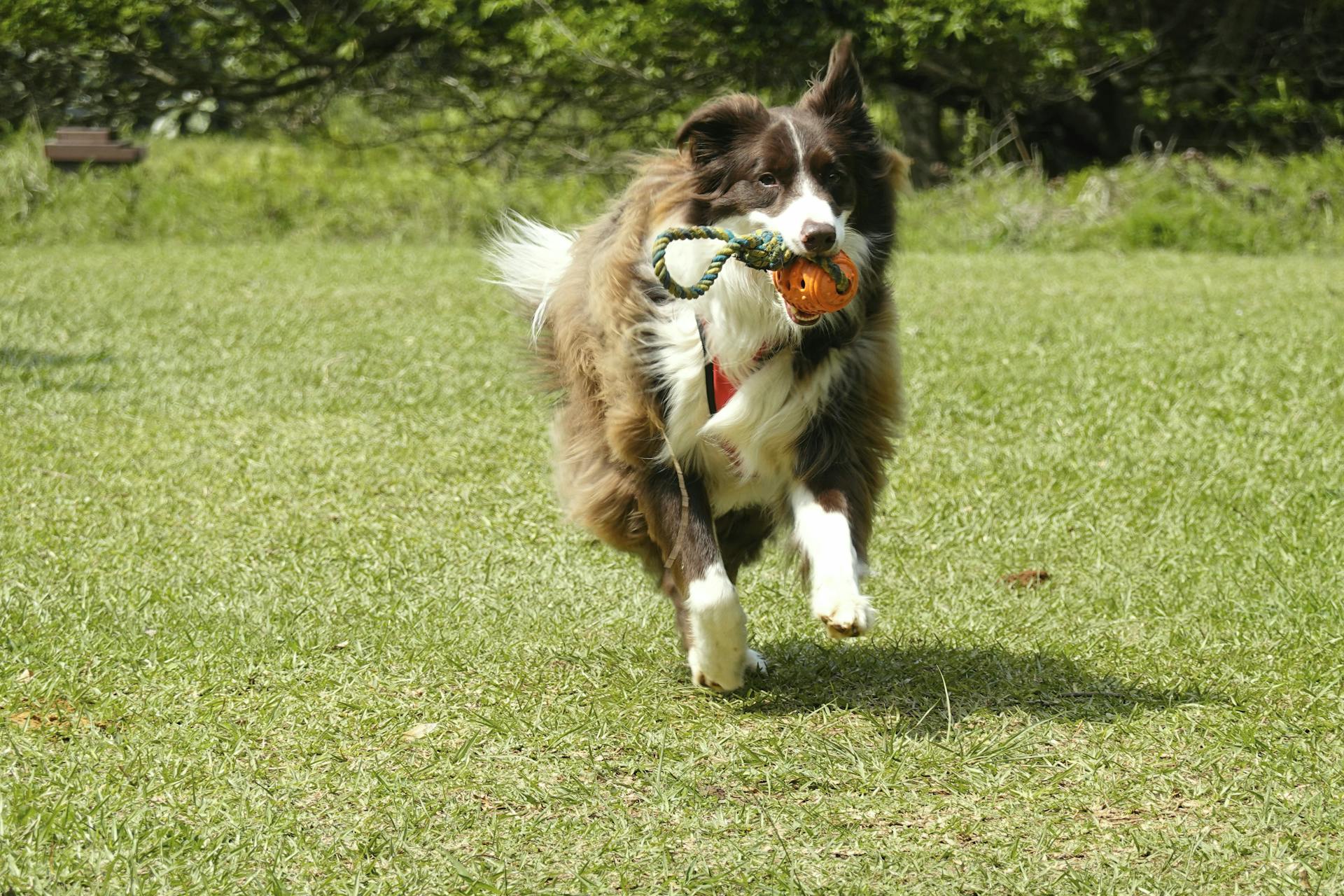
Dogs are often considered one of the smartest animals on the planet, but how do they stack up against other animals?
Chimpanzees, for example, are known to possess a level of intelligence similar to that of a human child. In a study, a chimpanzee was able to learn and use over 100 signs to communicate with its caretakers.
Dogs, on the other hand, have been observed to possess a unique ability to understand and respond to human gestures, such as pointing and waving. This is a skill that even some primates struggle to master.
In terms of problem-solving, dogs have been shown to be able to figure out complex puzzles and even learn from their mistakes. This level of cognitive ability is impressive, especially when compared to some other animals.
Dog Intelligence
Dogs are incredibly smart animals, capable of learning over 165 words on average, with some exceptional cases like Chaser the border collie learning more than 1,000 words. Dogs can solve problems, recognize human emotions, and even understand basic grammar.
Their emotional intelligence is impressive, with dogs able to read human facial expressions and tones of voice. They can distinguish between positive and negative facial expressions, showing more engagement with happy faces and avoiding angry ones.
Dogs have been bred for thousands of years to socialize with humans, which has made them hardwired to develop friendly qualities. They form attachment relationships with their owners, similar to how human children are attached to their mothers.
Research has shown that dogs can empathize with humans and have a theory of mind, meaning they can understand what we're thinking and reciprocate with their own thoughts and behaviors. This means that the idea that you must be your dog's pack leader is a mistake.
Dogs have three types of intelligence: adaptive, working and obedience, and instinctive. Adaptive intelligence is about social skills and problem-solving, which dogs excel at. They can learn to interpret facial expressions, find hidden treats, and even learn to follow commands.
Some dogs are naturally more intelligent than others, with breeds like border collies and wolves showing exceptional problem-solving skills. Playful dogs are more likely to interact with their owners and learn words more easily, making them potentially more intelligent.
Overall, dogs are incredibly smart animals that are capable of learning, problem-solving, and even understanding human emotions. With proper training and socialization, any dog can become a loyal and loving companion.
On a similar theme: Pigs Intelligence vs Dogs
Dog Behavior and Socialization
Dogs are incredibly adept at reading human emotions, with one study showing they can distinguish between positive and negative facial expressions, and even respond accordingly.
Dogs can learn an impressive number of words, with some, like Chaser the border collie, learning over 1,000 words.
Their ability to understand human emotions and social cues is a testament to their emotional intelligence, which is essential for their ability to problem-solve and adapt to their environment.
In fact, dogs can even recognize when a human is helpful or unhelpful, and will favor the helpful person in some contexts.
By paying close attention to human behavior and social interactions, dogs are able to draw complex conclusions about what we know and feel.
Recommended read: Are Dogs Social Animals
Dogs: Socially
Dogs are incredibly good at reading human behavior, and it's not just because they're attentive to us. They can distinguish between positive and negative facial expressions, showing more engagement with happy faces and avoiding angry ones.
Dogs can learn over 165 words, making them capable of understanding complex commands. One particularly smart pup, Chaser the border collie, learned more than 1,000 words.
Researchers don't entirely agree on why dogs are so socially savvy, but the prevailing view is that it's evolutionary. Over the thousands of years since wolves entered the human sphere and started to morph into the pets we know today, breeding has favored qualities that make dogs good companions to humans.
Dogs pay really close attention to how we interact with each other, and they even notice whether a human is helpful or unhelpful. In some contexts, dogs will favor the helpful person.
Dogs form an attachment relationship with their owners, and very likely with other members of their group, that resembles the way human children are attached to their mothers. This emotional connection between dogs and people goes beyond family pets.
Dogs can very rapidly form attachment to humans after only approximately 30 minutes of interaction, even in dog shelters.
Nurturing Your Dog
It's essential to indulge your dog's nose and let them sniff freely. This allows them to investigate the world with their noses, which can lead to a more optimistic approach to life.
Dogs are constantly communicating with you, so watch their behavior carefully instead of assuming you know what they want.
Letting your dog sniff is just the beginning - you can also keep them mentally stimulated by giving them new challenges and exposing them to new places and activities.
Consistency and clarity are key when communicating with your dog, so be clear when asking things of them.
Suggestion: What to Feed Dogs If No Dog Food
Emotional Intelligence in Dogs
Dogs can learn over 165 words, making them capable of understanding complex commands. Chaser the border collie learned more than 1,000 words.
Dogs exhibit emotional intelligence, responding to human facial expressions and tones of voice. They can distinguish between positive and negative facial expressions, showing more engagement with happy faces and avoiding angry ones.
Dogs form an attachment relationship with their owners, resembling the way human children are attached to their mothers. This emotional connection between dogs and people goes beyond family pets.
Dogs can empathize with humans and have a theory of mind, as shown by studies using functional MRIs. They even form attachment to humans in dog shelters after just 30 minutes of interaction.
Dogs have high adaptive intelligence, specializing in social skills and problem solving. They can interpret facial expressions and find hidden treats, and their abilities can be sharpened through bonding and play.
Dogs are social creatures, bred for millennia to socialize with humans, and as a result, they tend to have great adaptive intelligence. They just get us!
Training, Training, Training
Training is essential for a dog's cognitive development and strengthening their bond with you. It can also help keep your dog safe by teaching them to avoid forbidden areas and objects.
Dogs who work, such as assistance dogs and military dogs, need robust learning skills to accomplish their tasks, which requires a high level of working and obedience intelligence. This type of intelligence measures a pup's ability to undergo training and carry out commands and jobs effectively.
Proper training can improve a dog's working and obedience intelligence, helping them to become more responsive to commands and tasks. With commitment and perseverance, any furry friend can improve this skill.
Training also helps dogs deepen their relationship with you and better tune themselves to your emotions. By teaching your dog to read your emotions, you can strengthen your bond and create a more harmonious living situation.
Dogs who are well-trained can also make better decisions, such as avoiding forbidden areas or objects, which can lead to a happier and healthier pup. In fact, training can help improve a dog's decision-making skills and overall well-being.
By incorporating training into your dog's routine, you can help sharpen their minds and keep them engaged and stimulated. A little diligence can go a long way toward helping your dog's cognitive development and filling them with confidence.
Check this out: All about Dogs Dog Training
Exercising and Enriching Your Dog
Indulging your dog's nose is a great way to nurture their cognitive abilities. Let them sniff and investigate the world around them.
Dogs who are allowed to sniff have a more optimistic approach to life, according to canine behavior researchers. This is because their experiences are heavily scent-based, making sniffing a vital part of their mental stimulation.
To keep your dog mentally stimulated, experts recommend communication and consistency. Give them new challenges and expose them to new places and activities.
By being consistent and clear when asking things of them, you can teach your dog what you want or know. This is especially important if you want to prevent miscommunication and confusion.
Comparative Intelligence
Dogs are considered as smart as two-year-old children, according to Hungarian scientist Vilmos Csányi. This is reflected in their ability to learn and understand language, with some dogs capable of learning over 165 words.
Dogs' intelligence is not limited to language skills, as they also excel in problem-solving and social skills. In one study, 68 Border Collies were tested on various tasks, such as navigating barriers to get to food and following instructions, and the results showed that dogs performing well on one test were likelier to succeed on another.
Here's a comparison of dog intelligence with other animals:
Note: The list above is a simplified representation of the 30 smartest animals, as per the article section facts.
Key Takeaways

Dogs are highly social creatures that have been bred for millennia to interact with humans, which has helped them develop friendly qualities and strong adaptive intelligence.
Some of the smartest animals in the animal kingdom include dolphins, rats, pigeons, cats, and baboons, but it's difficult to compare animal intelligence as they have evolved different abilities to survive in their environments.
To gauge different aspects of intelligence, scientists have tried various methods, such as considering swarm intelligence, calculating the encephalization quotient, weighing emotional intelligence, and using MRIs on dogs to measure brain activity.
Here are some examples of how scientists have measured animal intelligence:
Dogs have been found to excel at reading body language and picking up verbal language, with some dogs learning up to 250 words and recognizing the names of over 1,000 objects.
Take a look at this: Dog Body Language with Other Dogs

Dogs have also been shown to have a solid grasp of mathematics, with studies finding that they can perceive differences in quantity and use a similar part of their brain to interpret numbers as humans do.
Dogs have indeed acquired behavioral traits that have human analogs, including the ability to form attachment relationships with their owners and other members of their group, and even adult dogs in shelters can rapidly form attachment to humans.
By the Numbers and Words
Dogs can learn a significant number of words, with the average dog able to learn around 165 words.
Research suggests that some dogs, particularly those in the top 20% of canine intelligence, can master up to 250 words.
A Border Collie named Chaser is a notable example of a dog with exceptional language skills, recognizing the names of more than 1,000 objects, which is equivalent to the vocabulary of a 3-year-old child.
Dogs also have a solid grasp of mathematics, with a 2019 study finding that they can perceive differences in quantity, such as when their bowl is filled with less food than usual.
The study showed that the parietotemporal cortex, an area of the canine brain that deals with sensory issues, was activated in the majority of the dogs tested, suggesting that dogs and humans use a similar part of their brain to interpret numbers.
In fact, dogs are considered to be as smart as two-year-old children, with some research suggesting that their word intelligence is similar to that of a 14- to 16-month-old baby.
For another approach, see: Dogs That Look like Bernese Mountain Dog
Dogs
Dogs are capable of learning over 165 words, making them proficient in understanding complex commands. This is impressive, considering the average human child can learn around 50 words per day.
One particularly smart pup, Chaser the border collie, learned more than 1,000 words, showcasing their ability to grasp language. Chaser's vocabulary is equivalent to that of a 3-year-old child.
Dogs can also perceive differences in quantity, such as when their bowl is filled with less food than usual. This is made possible by the activation of the parietotemporal cortex, an area of the canine brain that deals with sensory issues.
Dogs have a solid grasp on mathematics, and their ability to understand numbers is similar to that of humans. They can even recognize the presence of a novel object when associated with a novel vocalization, or "word."
Dogs have a remarkable ability to read body language and understand human emotions. They can distinguish between positive and negative facial expressions, showing more engagement with happy faces and avoiding angry ones.
Dogs form an attachment relationship with their owners, which is similar to the way human children are attached to their mothers. This emotional connection is a key aspect of their intelligence and is essential for their well-being.
21. Ravens
Ravens are highly social and intelligent birds that form complex societies with structured dominance hierarchies and social bonds.

Their intelligence is comparable to that of other socially complex species, like primates, and they can even solve numerical problems without any prior training.
Ravens are known for their impressive cognitive abilities, which include remembering former group members, deducing third-party relationships, and using social knowledge in conflicts and affiliations.
They have even been observed engaging in behaviors that resemble politics, forming alliances and intervening in social interactions.
These remarkable birds are also skilled at mimicking human speech, although they may not always choose to follow a command.
Their ability to cache, or hide, their food and return to it later shows memory and foresight, traits that are often associated with highly intelligent species.
Frequently Asked Questions
What is the average IQ of a dog?
The average IQ of a dog is around 100, but keep in mind that canine intelligence is measured differently than human IQ.
Sources
- https://animals.howstuffworks.com/animal-facts/10-smartest-animals.htm
- https://www.akc.org/expert-advice/lifestyle/dog-cognition-dogs-are-smarter-than-you-think/
- https://www.thewildest.com/dog-behavior/dog-intelligence
- https://www.nylabone.com/dog101/how-smart-are-dogs
- https://www.nbcnews.com/health/health-news/signs-dog-intelligence-gifted-dogs-play-study-finds-rcna41534
Featured Images: pexels.com


